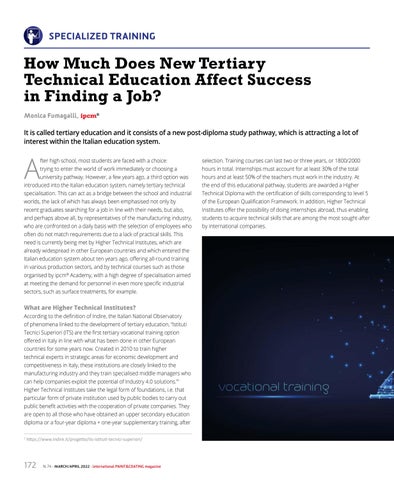SPECIALIZED TRAINING
How Much Does New Tertiary Technical Education Affect Success in Finding a Job? Monica Fumagalli, ipcm®
It is called tertiary education and it consists of a new post-diploma study pathway, which is attracting a lot of interest within the Italian education system.
A
fter high school, most students are faced with a choice:
selection. Training courses can last two or three years, or 1800/2000
trying to enter the world of work immediately or choosing a
hours in total. Internships must account for at least 30% of the total
university pathway. However, a few years ago, a third option was
hours and at least 50% of the teachers must work in the industry. At
introduced into the Italian education system, namely tertiary technical
the end of this educational pathway, students are awarded a Higher
specialisation. This can act as a bridge between the school and industrial
Technical Diploma with the certification of skills corresponding to level 5
worlds, the lack of which has always been emphasised not only by
of the European Qualification Framework. In addition, Higher Technical
recent graduates searching for a job in line with their needs, but also,
Institutes offer the possibility of doing internships abroad, thus enabling
and perhaps above all, by representatives of the manufacturing industry,
students to acquire technical skills that are among the most sought-after
who are confronted on a daily basis with the selection of employees who
by international companies.
often do not match requirements due to a lack of practical skills. This need is currently being met by Higher Technical Institutes, which are already widespread in other European countries and which entered the Italian education system about ten years ago, offering all-round training in various production sectors, and by technical courses such as those organised by ipcm® Academy, with a high degree of specialisation aimed at meeting the demand for personnel in even more specific industrial sectors, such as surface treatments, for example.
What are Higher Technical Institutes? According to the definition of Indire, the Italian National Observatory of phenomena linked to the development of tertiary education, “Istituti Tecnici Superiori (ITS) are the first tertiary vocational training option offered in Italy in line with what has been done in other European countries for some years now. Created in 2010 to train higher technical experts in strategic areas for economic development and competitiveness in Italy, these institutions are closely linked to the manufacturing industry and they train specialised middle managers who can help companies exploit the potential of Industry 4.0 solutions.”1 Higher Technical Institutes take the legal form of foundations, i.e. that particular form of private institution used by public bodies to carry out public benefit activities with the cooperation of private companies. They are open to all those who have obtained an upper secondary education diploma or a four-year diploma + one-year supplementary training, after 1
https://www.indire.it/progetto/its-istituti-tecnici-superiori/
172
N. 74 - MARCH/APRIL 2022 - international PAINT&COATING magazine
